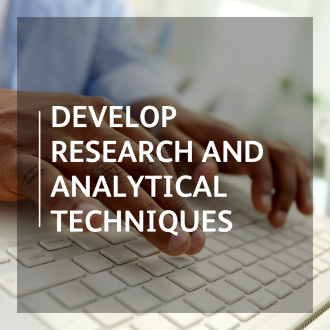- Postgraduate
Business Analytics MSc
Overview
Whether you want to kick-start a brand-new career, boost your existing experience, or change career direction, studying MSc Business Analytics enables you to benefit from the latest lecture material on the subject as well as the expertise of direct contacts in the industry who will bridge the gap between academic rigour and practical relevance.
Taught by members of the CLBS academic community who boast extensive boardroom and classroom experience, the course delivers a pastoral approach and unique hands-on learning experience.
As well as opportunities to apply and assimilate your acquired techniques through assessments at regular points in your training, you will have research practices, personal reflection and analysis within the modules.
Your learning and development will be monitored across terms and modules through practical assessments, tutorials and discussion of written observations and feedback.
Teaching hours
Classes will be scheduled for 2-3 days per week.

Select your desired study option, then pick a start date to see relevant course information:
Start date:
If your desired start date is not available, try selecting a different study option.
Why study Business Analytics with us?


What our students say…
The connections the university has provides links for its student to meet prospective employers and know more about what it takes to make it in the industry. The teachers are specialised in their fields to ensure we get the most out of every single bit of text we go over. Classes are not blank with just words on paper, we have a selection of activities and seminars too.




Course detail & modules
Studying MSc Business Analytics with UWL enables you to benefit from not only the latest lecture material on the subject but also the expertise of direct contacts in the industry who will bridge the gap between academic rigour and practical relevance.
The course is taught by members of the CLBS academic community who, as well as boasting extensive boardroom and classroom experience, will deliver a pastoral approach and unique hands-on learning experience for you.
Throughout, the course embeds and develops core technical skills and approaches which bolster business analytics training, key processes, and methodologies. You will be able to fine-tune these acquired techniques through projects that require these skills to be embodied and integrated holistically.
Research practices, personal reflection, and analysis are incorporated within the modules that focus on developing integral skills for appraising techniques and methodological tools.
By the end of the course, you will be able to:
- apply your knowledge and skills to complex business projects
- demonstrate your acquired technical abilities in business analytics
- conduct independent research
- make practical recommendations on real-life business issues.
This course will provide a thorough, practical foundation to apply your knowledge and skills to complex business projects and make practical recommendations on real-life business issues. It will provide a platform for careers with local and international companies as well as high-growth businesses confronting world-scale challenges.
Compulsory modules
-
Business Statistics and Forecasting
In this module, you will be introduced to some fundamental methods of statistical analysis, research and forecasting used in business.
-
Data Analytics and predictive modelling
This module will aim to help you to form hypotheses, while the module on Business Statistics and Forecasting lets you test such hypotheses and improves the quality of your answers.
-
Business Analysis
This module aims to embed and develop your core technical skills and approaches which underpin business analytics training, key processes, and methodologies.
-
Data Analytics Tools
This module aims to equip you with hands-on, practical skills in data analytics, computing, and business to enable them to transform data and ultimately improve business processes and decision-making. Digital tools can be used to communicate, monitor progress, optimise content, and deepen client engagement, optimise productivity, and maximise revenue and profits. The module provides you with the skillset required to manage a business in today’s digital world and contribute to the ever-growing field of data analysis.
-
Financial Management for Decision Makers
Financial literacy is essential for every manager in order to review financial statements, to get a complete picture of the financial health of the organisation and to have a good understanding of how financial decisions impact on the value of the organisation. Particularly, managers need to understand the balance sheet, profit and loss account and cash flow statement. By being financial literate, managers can contribute more fully and with more confidence to strategic decision making.
This module provides basic financial principals and covers financial management tools necessary for decision making. It enables you to find relevant information, assess and recognise financial risk in advance, evaluate and choose investment projects that maximise company value. It helps you to understand ratios, performance metrics, investment decisions and business valuation principles.
-
Programming Skills for data analytics professionals
-
Critical inquiry in data analytics and applied project
Entry requirements
First-degree performance of a UK Honours Degree Class 2:2 or equivalent, from courses with a quantitative background. Students not holding a first degree but with a practical industry experience of over 5 years, will be offered an interview so that their eligibility or otherwise to embark on the course is assessed.
You need to meet our English language requirement of 6.5 overall score for IELTS, with a minimum of 5.5 for each of the 4 individual components (Reading, Writing, Speaking and Listening). Visit our English language requirements page for information on other English language tests we accept.
You also need academic qualifications at the same level as UK applicants. In some countries where teaching is in English, we may accept local qualifications. Check for local equivalents.
We offer pre-sessional English language courses if you do not meet these requirements. Find out more about our English Language courses.
Teaching staff

Dr Michael Nimo
I have twelve years of proven teaching experience in UK higher education, with most years at Russell Group Universities. I have a passion to instruct and deliver constructive and collaborative academic direction to help develop learners. This is supported by providing tailored and empathetic pastoral care.
My teaching philosophy is mainly progressivism (career-focused teaching), which is a student-oriented approach that considers the significance of individuality and its connection to active learning. Progressivism states that the ideal learning situation is when the subject matter is relevant to the life of the learner and their abilities.
I have twelve years of proven teaching experience in UK higher education, with most years at Russell Group Universities. I have a passion to instruct and deliver constructive and collaborative academic direction to help develop learners. This is supported by providing tailored and empathetic pastoral care.
My teaching philosophy is mainly progressivism (career-focused teaching), which is a student-oriented approach that considers the significance of individuality and its connection to active learning. Progressivism states that the ideal learning situation is when the subject matter is relevant to the life of the learner and their abilities.
Study & career progression

Having an MS Business Analytics degree can open the door to many exciting and rewarding careers. Some of the fields our graduates tend to move into include:
- marketing
- financial analyst
- management analyst
- business intelligence analyst.
Alternatively, you may want to explore a related area of study. Please see our full list of courses.
How to apply

You can apply online at any time by following the link below.
Our application form will ask you for some information about:
- what you want to study
- your previous qualifications or experience
- your references
- how we can contact you.
Want to ask us a question first? We would love to hear from you. Contact us free on:
- 0800 036 8888
- courses@uwl.ac.uk
Apply for this course
Next steps after making your application
We aim to make a decision on your application as quickly as we can. If we need any more information about your qualifications, we will be in touch.
In the meantime, come and visit us and find out more about what studying at UWL is like. Sign up for an open day or join a campus tour.
Visit us and see for yourself
Talk to our tutors and find out about our courses and facilities at our next open day or join a campus tour.
We're here to help
Any questions about a course or studying at UWL? We're here to help - call us on 0800 036 8888 (option 2, Monday – Friday 10am-4pm) or email us on courses@uwl.ac.uk.
Our postgraduate prospectus
All of our courses in one place - download now or order a hard copy.

You can apply online at any time by following the link below.
Our application form will ask you for some information about:
- what you want to study
- your previous qualifications or experience
- your references
- how we can contact you.
Want to ask us a question first? We would love to hear from you. Contact us free on:
- 0800 036 8888
- courses@uwl.ac.uk
Apply for this course
Next steps after making your application
We aim to make a decision on your application as quickly as we can. If we need any more information about your qualifications, we will be in touch.
In the meantime, come and visit us and find out more about what studying at UWL is like. Sign up for an open day or join a campus tour.
Visit us and see for yourself
Talk to our tutors and find out about our courses and facilities at our next open day or join a campus tour.
We're here to help
Any questions about a course or studying at UWL? We're here to help - call us on 0800 036 8888 (option 2, Monday – Friday 10am-4pm) or email us on courses@uwl.ac.uk.
Our postgraduate prospectus
All of our courses in one place - download now or order a hard copy.

You can apply online at any time by following the link below.
Our application form will ask you for some information about:
- what you want to study
- your previous qualifications or experience
- your references
- your visa (if required)
- how we can contact you.
Want to ask us a question first? Our dedicated international students’ team would love to hear from you.
- email international@uwl.ac.uk to submit a question
Apply for this course
Next steps after making your application
We aim to make a decision on your application as quickly as we can. If we need any more information about your qualifications, we will be in touch.
In the meantime, come and visit us and find out more about what studying at UWL is like. Sign up for an open day or join a campus tour.
Visit us and see for yourself
Talk to our tutors and find out about our courses and facilities at our next open day or join a campus tour.
We're here to help
Any questions about a course or studying at UWL? We're here to help - call us on 0800 036 8888 (option 2, Monday – Friday 10am-4pm) or email us on courses@uwl.ac.uk.
Our postgraduate prospectus
All of our courses in one place - download now or order a hard copy.

You can apply online at any time by following the link below.
Our application form will ask you for some information about:
- what you want to study
- your previous qualifications or experience
- your references
- your visa (if required)
- how we can contact you.
Want to ask us a question first? Our dedicated international students’ team would love to hear from you.
- email international@uwl.ac.uk to submit a question
Apply for this course
Next steps after making your application
We aim to make a decision on your application as quickly as we can. If we need any more information about your qualifications, we will be in touch.
In the meantime, come and visit us and find out more about what studying at UWL is like. Sign up for an open day or join a campus tour.
Visit us and see for yourself
Talk to our tutors and find out about our courses and facilities at our next open day or join a campus tour.
We're here to help
Any questions about a course or studying at UWL? We're here to help - call us on 0800 036 8888 (option 2, Monday – Friday 10am-4pm) or email us on courses@uwl.ac.uk.
Our postgraduate prospectus
All of our courses in one place - download now or order a hard copy.
Search for courses
Student life at UWL
Important notes for applicants
Disclaimer
*Modern universities - defined as higher education institutions that were granted university status in, and subsequent to, 1992.
**The National Student Survey 2023 and 2024 - Average of answers to all questions by registered student population. Excludes specialist institutions.
Testimonials - our students or former students provided all of our testimonials - often a student from the course but sometimes another student. For example, the testimonial often comes from another UWL student when the course is new.
Optional modules - where optional modules are offered they will run subject to staff availability and viable student numbers opting to take the module.
Videos - all videos on our course pages were accurate at the time of filming. In some cases a new Course Leader has joined the University since the video was filmed.
Availability of placements - if you choose a course with placement/internship route we would like to advise you that if a placement/internship opportunity does not arise when you are expected to undertake the placement then the University will automatically transfer you to the non-internship route, this is to ensure you are still successful in being awarded a degree.








